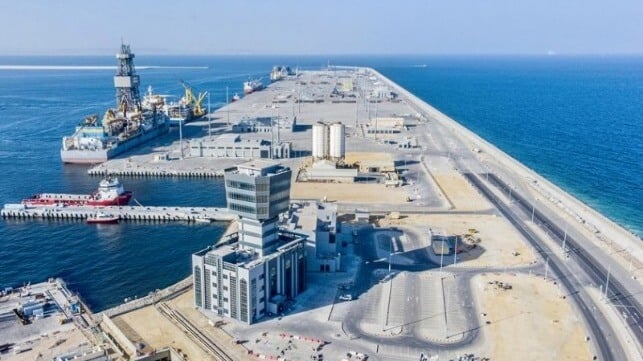Oman Pioneers Green Hydrogen Maritime Corridor to Europe

Oman is promoting the adoption of a green hydrogen maritime corridor from a loading terminal in Duqm through to the port of Amsterdam as an initiative to support the International Maritime Organisation achieve its Net Zero greenhouse gas targets by 2050. Green hydrogen is to be produced on a net-zero basis using energy from solar and wind farms in the hinterland of Duqm, and processed in the port area.
Development of a pioneering transmission corridor to take the fuel through to Europe will necessitate the solution of a number of regulatory and technical problems associated with the adoption of hydrogen for bunkering. It is anticipated that it will, in turn, prepare the way for the rollout of hydrogen supply chains as an integral element of critical maritime infrastructure.
The green hydrogen maritime corridor initiative was the subject of an agreement between the Netherlands and the Sultanate of Oman made in May, when Sultan Haitham visited the Netherlands on a state visit. Sultan Haitham made a similar agreement when visiting Belgium last year, and the corridor concept thus also embraces offload points in the Port of Antwerp, with an onward shipment network to the Port of Duisburg on the Rhine. A similar green hydrogen maritime corridor is under development to link Algeciras in Spain with Rotterdam.
For the concept to be realized, and then utilized across the whole of the global maritime community, the project will need to create a harmonized safety regulation regime for hydrogen bunkering. Technical standards and solutions also need to be developed to support hydrogen-fueled ship operations, and the handling of hydrogen terminal operations in port. These issues, and the current lack of international standards, are already being considered by the Maritime Technologies Forum. A project management framework also needs to be developed to support the launch of port infrastructure development projects, the lack of which, from a financial and engineering perspective, is a hindrance to efficient progress.
In August, BP upped its stake in one of the green hydrogen consortia awarded contracts to operate through Duqm, increasing its share in the Hyport Duqm green hydrogen project to 49 percent, with Belgium’s DEME and the Omani sovereign wealth fund OQ each retaining a 25.5 percent stake.
The Hydrom Duqm project is in the pre-engineering design phase, and commercial operations utilizing the green hydrogen maritime corridor to Europe are scheduled to commence in 2030. It is too early to estimate which of the consortia awarded green hydrogen mandates will be the first into production, but BP’s move underlines the oil major’s confidence in Oman’s overall green hydrogen strategy.
